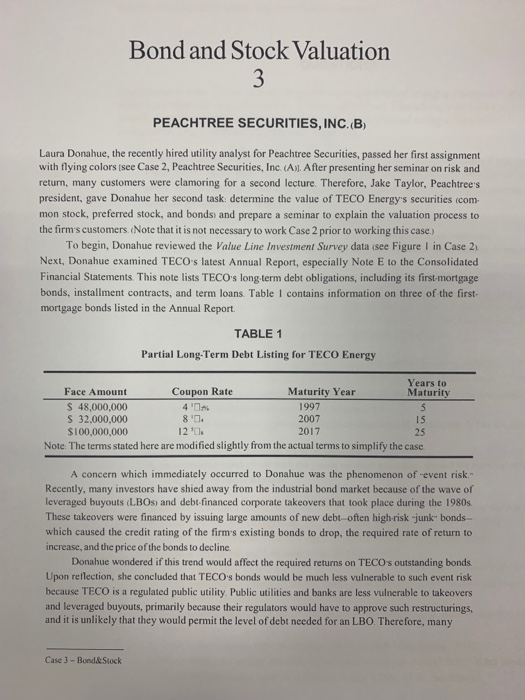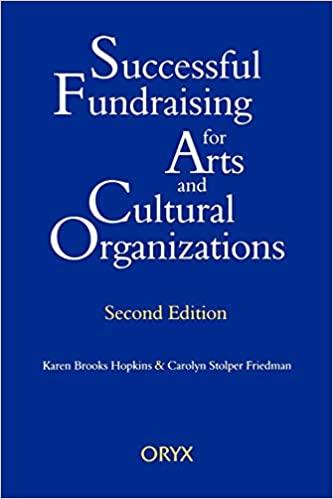Bond and Stock Valuation PEACHTREE SECURITIES, INC. (B) Laura Donahue, the recently hired utility analyst for Peachtree Securities, passed her first assignment with flying colors see Case 2, Peachtree Securities, Inc. (A). After presenting her seminar on risk and return, many customers were clamoring for a second lecture. Therefore, Jake Taylor, Peachtree's president, gave Donahue her second task: determine the value of TECO Energy's securities com mon stock, preferred stock, and bonds and prepare a seminar to explain the valuation process to the firm's customers. (Note that it is not necessary to work Case 2 prior to working this case) To begin, Donahue reviewed the Value Line Investment Survey data (see Figure 1 in Case 2 Next, Donahue examined TECO's latest Annual Report, especially Note E to the Consolidated Financial Statements. This note lists TECO's long-term debt obligations, including its first mortgage bonds, installment contracts, and term loans. Table I contains information on three of the first mortgage bonds listed in the Annual Report. TABLE 1 Partial Long-Term Debt Listing for TECO Energy Years to Face Amount Coupon Rate Maturity Year Maturity $ 48,000,000 1997 S 32,000,000 8 2007 $100,000,000 12'0 2017 Note The terms stated here are modified slightly from the actual terms to simplify the case A concern which immediately occurred to Donahue was the phenomenon of event risk Recently, many investors have shied away from the industrial bond market because of the wave of leveraged buyouts (LBOS) and debt financed corporate takeovers that took place during the 1980s These takeovers were financed by issuing large amounts of new debt often high-risk-junk bonds which caused the credit rating of the firm's existing bonds to drop, the required rate of return to increase, and the price of the bonds to decline Donahue wondered if this trend would affect the required returns on TECOs outstanding bonds Upon reflection, she concluded that TECO s bonds would be much less vulnerable to such event risk because TEC is a regulated public utility. Public utilities and banks are less vulnerable to takeovers and leveraged buyouts, primarily because their regulators would have to approve such restructurings. and it is unlikely that they would permit the level of debt needed for an LBO. Therefore, many Case 3 - Bonde Stock Case: 03 Bond and Stock Valuation investors have turned to government bonds, mortgage backed issues, and utility bonds in lieu of pub licly traded corporate bonds. As a result, Donahue concluded that the effect, if any, of the increased concern about event risk will be to lower TECO's cost of bond financing With these considerations in mind, your task is to help Donahue pass her second hurdle at Peachtree Securities by answering the following questions 5. Now assume that the 15-year bond is callable after 5 years at $1,050. a. What is its yield to call (YTC)? b. Do you think it is likely that the bond will be called? Bond and Stock Valuation PEACHTREE SECURITIES, INC. (B) Laura Donahue, the recently hired utility analyst for Peachtree Securities, passed her first assignment with flying colors see Case 2, Peachtree Securities, Inc. (A). After presenting her seminar on risk and return, many customers were clamoring for a second lecture. Therefore, Jake Taylor, Peachtree's president, gave Donahue her second task: determine the value of TECO Energy's securities com mon stock, preferred stock, and bonds and prepare a seminar to explain the valuation process to the firm's customers. (Note that it is not necessary to work Case 2 prior to working this case) To begin, Donahue reviewed the Value Line Investment Survey data (see Figure 1 in Case 2 Next, Donahue examined TECO's latest Annual Report, especially Note E to the Consolidated Financial Statements. This note lists TECO's long-term debt obligations, including its first mortgage bonds, installment contracts, and term loans. Table I contains information on three of the first mortgage bonds listed in the Annual Report. TABLE 1 Partial Long-Term Debt Listing for TECO Energy Years to Face Amount Coupon Rate Maturity Year Maturity $ 48,000,000 1997 S 32,000,000 8 2007 $100,000,000 12'0 2017 Note The terms stated here are modified slightly from the actual terms to simplify the case A concern which immediately occurred to Donahue was the phenomenon of event risk Recently, many investors have shied away from the industrial bond market because of the wave of leveraged buyouts (LBOS) and debt financed corporate takeovers that took place during the 1980s These takeovers were financed by issuing large amounts of new debt often high-risk-junk bonds which caused the credit rating of the firm's existing bonds to drop, the required rate of return to increase, and the price of the bonds to decline Donahue wondered if this trend would affect the required returns on TECOs outstanding bonds Upon reflection, she concluded that TECO s bonds would be much less vulnerable to such event risk because TEC is a regulated public utility. Public utilities and banks are less vulnerable to takeovers and leveraged buyouts, primarily because their regulators would have to approve such restructurings. and it is unlikely that they would permit the level of debt needed for an LBO. Therefore, many Case 3 - Bonde Stock Case: 03 Bond and Stock Valuation investors have turned to government bonds, mortgage backed issues, and utility bonds in lieu of pub licly traded corporate bonds. As a result, Donahue concluded that the effect, if any, of the increased concern about event risk will be to lower TECO's cost of bond financing With these considerations in mind, your task is to help Donahue pass her second hurdle at Peachtree Securities by answering the following questions 5. Now assume that the 15-year bond is callable after 5 years at $1,050. a. What is its yield to call (YTC)? b. Do you think it is likely that the bond will be called









